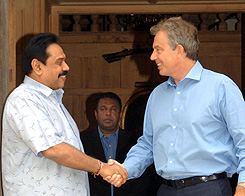On War Criminals & Privileged Holidaymakers
Ex British Prime Minister and multi-millionaire Tony Blair’s summer holiday in Sri Lanka has been taking place under privileged conditions, with next to no media exposure. A visit that takes place on the invitation of those holding the reins of power in Colombo, the Blairs were provided with state security and amenities during their visit. Two people who have played a special role in facilitating this visit were, indeed, Mnagala Samaraweera MP andChandrika Kuamaratunga. The former, a clothing design graduate of Central Saint Martin’s in London, was also instrumental in fixing up a meeting between Tony Blair and Mahinda Rajapaksa back in 2006. That meeting took place in Britain, at a different time, for Messrs Samaraweera, Rajapaksa and Blair. In the previous year, Samaraweera played a frontline role in Rajapaksa’s presidential campaign, which led to Rajapaksa’s election as Sri Lanka’s fifth executive president. In that same year, Blair secured his third re-election as British Prime Minister, with a parliamentary majority slashed to a mere 66 seats (as opposed to UK Labour’s 160-seat majority in the previous parliament). Having been Prime Minister since 1997, Blair’s popularity was in decline. A key reason for this was Blair’s decision to support the Bush administration’s war in Iraq, in the absence of a 2nd UN resolution. At the 2005 general election, the Liberal Democrats castigated Blair as responsible for the carnage that was Iraq, an argument that won for them a good few disenchanted Labour voters.
Flash forward to 2015.
Having just won the general election with a high count of preferential votes, Samaraweera has been reappointed to a cabinet ministerial portfolio somewhat removed, to say the very least, from his profession-proper (i.e. fashion designer) – that of foreign affairs. Indeed, Sri Lanka often distinguishes herself in appointing individuals with no prior experience in diplomacy and/or international civil service, no significant foreign experience, experience with international consultancies, or remarkable foreign language skills (other than Sinhala, Tamil and English) to spearhead its foreign policy apparatus. Having said that, Samaraweera’s appointment is less appalling, when compared with some of his predecessors, and more alarmingly, the track record of foreign affairs ministers who happened to be highly qualified, such as university professors. To borrow from Paul Auster, the Music of Chance certainly appears to be in Samaraweera’s favour in the 2015 quarter.
Rajapaksa
 Rajapaksa was ousted from power in January 2015. Local specifics put aside, this was the result of an operation that received U.S. and Indian endorsement. Given the security challenges the USA is facing in the South China Sea, there is a clear effort to ensure that USA-friendly governments hold power across the South and Southeast Asian regions. In this light, it was neither majoritarian politics, corruption nor nepotism that caused disfavour for Rajapaksa internationally, but his close ties with Beijing. Rajapaksa’s second attempt at a political comeback was equally thwarted, through political machinations that ensured the West’s preferred outcome. Media reports indicate that Rajapaksa has nonetheless decided to remain in politics, most probably to wait for a new opportunity to spearhead a Sinhala nationalist uproar against the Ranil Wickremesinghe government. There is no question of the fact that the Rajapaksa ousting has been favourable for media freedom and fundamental rights. Domestically, a primary cause of public disenchantment with the Rajapaksa administration stemmed from the myopic policies of his siblings and preposterousness of his offspring. Despite his downfall, Rajapaksa continues to command the support of a considerable segment of the Sinhala community.
Rajapaksa was ousted from power in January 2015. Local specifics put aside, this was the result of an operation that received U.S. and Indian endorsement. Given the security challenges the USA is facing in the South China Sea, there is a clear effort to ensure that USA-friendly governments hold power across the South and Southeast Asian regions. In this light, it was neither majoritarian politics, corruption nor nepotism that caused disfavour for Rajapaksa internationally, but his close ties with Beijing. Rajapaksa’s second attempt at a political comeback was equally thwarted, through political machinations that ensured the West’s preferred outcome. Media reports indicate that Rajapaksa has nonetheless decided to remain in politics, most probably to wait for a new opportunity to spearhead a Sinhala nationalist uproar against the Ranil Wickremesinghe government. There is no question of the fact that the Rajapaksa ousting has been favourable for media freedom and fundamental rights. Domestically, a primary cause of public disenchantment with the Rajapaksa administration stemmed from the myopic policies of his siblings and preposterousness of his offspring. Despite his downfall, Rajapaksa continues to command the support of a considerable segment of the Sinhala community.



